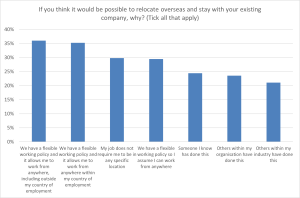More than half of Singapore workers believe they could relocate overseas and remain employed at the same company, reveals ADP Research Institute’s People at Work 2023: A Global Workforce View.
The percentage is even higher for workers in the Media/Information industry, where 88% believe they can relocate remotely and still work for their employer.
The Media/Information industry, while not in the top three industries in Singapore, is still a sizeable sector by business count.
For those who believe they can relocate and work remotely, 36% share that their company has a flexible working policy that allows them to work from anywhere, including outside their country of employment.
Interestingly, close to 24% of workers state that they know someone within their organisation who has taken advantage of this benefit, suggesting that remote relocation is already gaining traction within companies.
Singapore is the business hub for many companies looking to expand into Southeast Asia. At the same time, Singapore boasts a cosmopolitan, well-travelled workforce accustomed to working in different regions and time zones.
Remote relocation while working for the same company would be an easy adaptation for these workers. In fact, 29% of Singapore workers believe that in the next five years, they will have the ability to work remotely from anywhere in the world.
 Yvonne Teo, Vice President of HR, APAC, ADP, comments, “Globally, hybrid working arrangements is becoming the norm. In fact, we understand that in Singapore, close to 7-in-10 companies (69%) allow workers varying levels of flexibility when it comes to working from home and in the office.”
Yvonne Teo, Vice President of HR, APAC, ADP, comments, “Globally, hybrid working arrangements is becoming the norm. In fact, we understand that in Singapore, close to 7-in-10 companies (69%) allow workers varying levels of flexibility when it comes to working from home and in the office.”
“That fact that half of the Singapore workers believe that they can relocate overseas while working for the same company suggests that flexibility is emerging as a highly sought-after workplace benefit,” she said.
Teo added, “In roles where it’s possible to work remotely, especially in the Media/Information industry which does not always require a physical presence, this concept takes on an increasingly international perspective.”
“And there are benefits to this. Companies can retain talent even if they must relocate for personal reasons; benefit from a multi-nation perspective; as well as take advantage of time zones to maximise production,” as she continues.
“There are however administrative constraints to consider. Employers must make it clear to workers whether working from abroad is permissible or not, and in what circumstances, and be prepared to deal with any requests to work overseas that may arise.”
Teo concluded, “Given tax and compliance regulations, employers will have to think carefully about whether this is something they would be comfortable allowing. There may be security and logistical issues, such as providing safe access to company networks,”
Global findings
Globally, the figures are similar. Almost half of workers (48%) think they could relocate overseas and still stay working for their current employer.
Workers say they believe they can do this because their employer’s flexible working policy allows such a move (or they assume it does); their job doesn’t require them to be in a specific location; or they’ve seen others do it.
The report thus highlights the extent to which international borders are becoming less of a barrier to in-demand workers – and especially to ‘digital nomads’ who can work remotely from anywhere.
The report surveyed over 32,000 workers in 17 countries and explores employees’ attitudes towards the current world of work and what they expect and hope for from the workplace of the future.






















